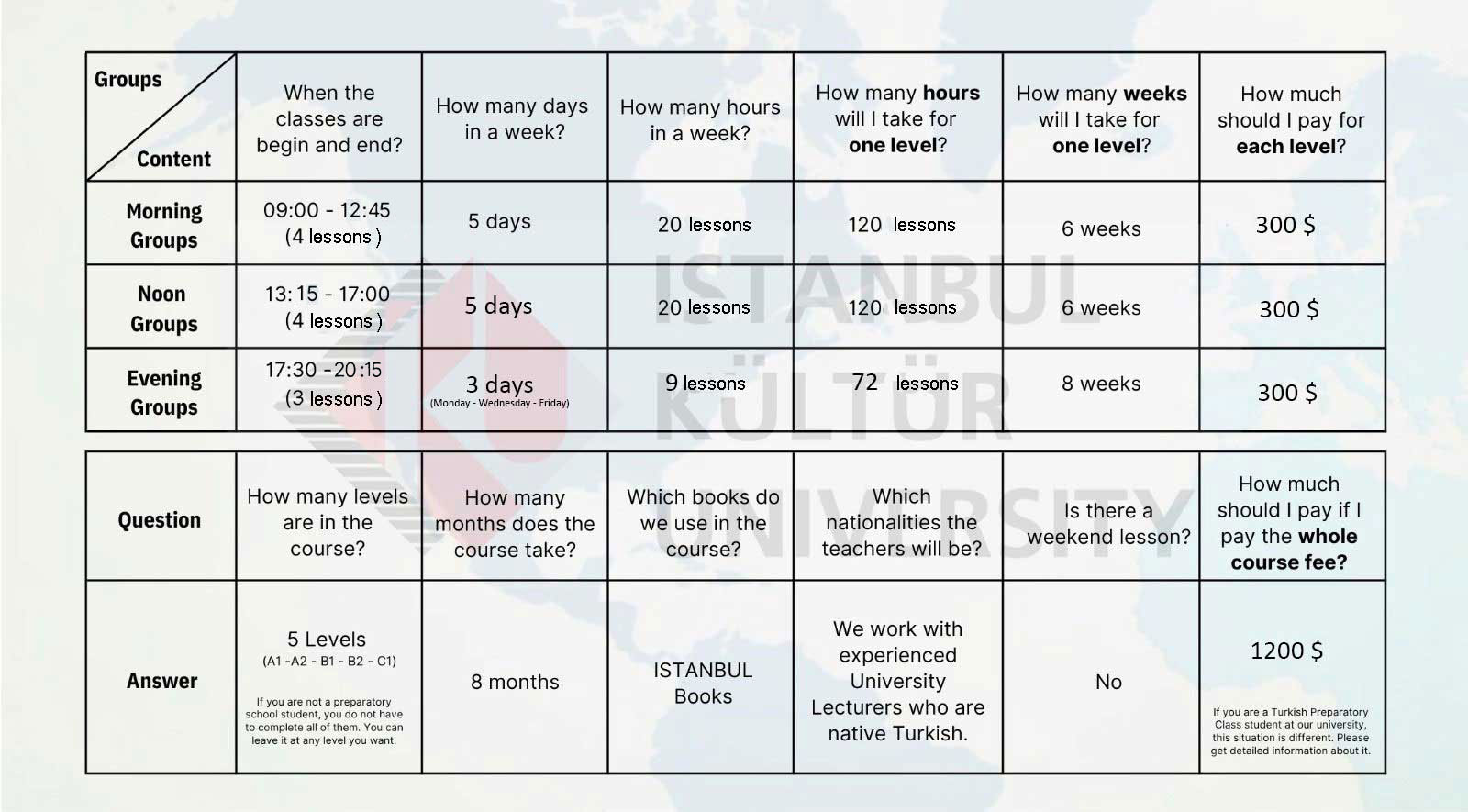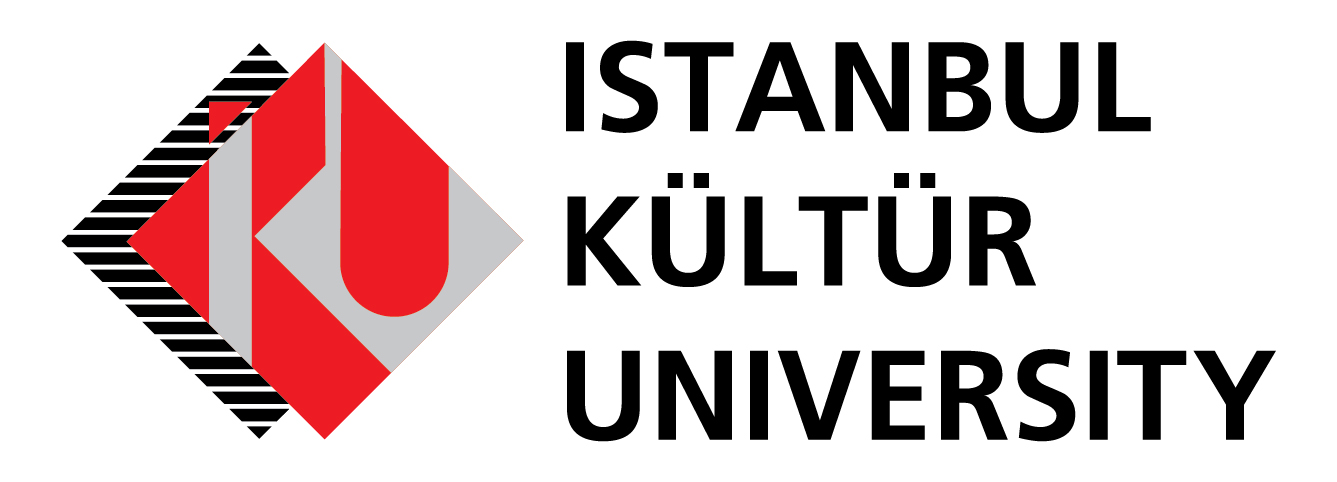6 weeks.
You can see detailed information in the table below.

Turkish courses at İKÜTÜMER have 5 levels*:
- 2 Basic levels (A1, A2);
- 2 Intermediate levels (B1, B2) and
- 1 Advanced level (C1).
Students learning Turkish are assessed to see their progress in four main language skills (listening, reading, speaking, and writing) and sub-skills (grammar and vocabulary).
In our course, we provide education in the modern conditions and at European standards as language proficiency.
We offer Turkish courses for all your needs with all native and fully experienced teachers in teaching Turkish for foreigners.
We use Istanbul Turkish books in Turkish lessons.
Our students take lessons in four main language skills (listening, speaking, reading and writing) and sub-skills (grammar and vocabulary).

In addition to these lessons, we watch Turkish movies and TV series with our students.
We also organize various excursions and activities to practice more Turkish.
For many students; It may take about 3 months (Basic level) to be able to shop, go to the hospital, and solve their own problems in a simple way.
But it is important for our students who want to learn Turkish very well to continue their education for 8-9 months.
| A1 (Basic) | Can understand and use familiar everyday expressions and very basic phrases aimed at the satisfaction of needs of a concrete type. Can introduce him/herself and others and can ask and answer questions about personal details such as where he/she lives, people he/she knows and things he/she has. Can interact in a simple way provided the other person talks slowly and clearly and is prepared to help. |
| A2 (Basic) | Can understand sentences and frequently used expressions related to areas of most immediate relevance (e.g. very basic personal and family information, shopping, local geography, employment). Can communicate in simple and routine tasks requiring a simple and direct exchange of information on familiar and routine matters. Can describe in simple terms aspects of his/her background, immediate environment and matters in areas of immediate need. |
| B1 (Independent) | Can understand the main points of clear standard input on familiar matters regularly encountered in work, school, leisure, etc. Can deal with most situations likely to arise whilst traveling in an area where the language is spoken. Can produce simple connected text on topics which are familiar or of personal interest. Can describe experiences and events, dreams, hopes & ambitions and briefly give reasons and explanations for opinions and plans. |
| B2 (Independent) | Can understand the main ideas of complex text on both concrete and abstract topics, including technical discussions in his/her field of specialisation. Can interact with a degree of fluency and spontaneity that makes regular interaction with native speakers quite possible without strain for either party. Can produce clear, detailed text on a wide range of subjects and explain a viewpoint on a topical issue giving the advantages and disadvantages of various options. |
| C1 (Proficient) | Can understand a wide range of demanding, longer texts, and recognize implicit meaning. Can express him/herself fluently and spontaneously without much obvious searching for expressions. Can use language flexibly and effectively for social, academic and professional purposes. Can produce clear, well-structured, detailed text on complex subjects, showing controlled use of organizational patterns, connectors and cohesive devices. |
300 USD (for 6 weeks / 120 lessons)
You can see detailed information in the table below.
YES.
However, just like the TOEFL and IELTS procedure, you have to take an exam for Turkish.
We organize this exam and if you are successful at the end of the exam, you can get a Turkish certificate valid in all Turkish official institutions.
Apart from this, you can also get a certificate of attendance at the end of each course without an exam. But this document is only a document showing that you have attended the course and completed some levels.
In order to use it in your official works, we recommend that you take the exam and get a certificate as described above.
We come across this question all the time, but don't worry. You will answer this yourself after only 1 week :)
Our classrooms have students from many different nationalities. Although English is generally accepted as a "common language", we may have many students who do not speak English.
For this reason, we use Turkish as a common language after entering the classroom.
Because the target language is Turkish. Getting help with different languages is not a very suitable situation in terms of language learning.
After just 1 week, you will get used to taking Turkish lessons without any help.
If the student who wants to enroll has learned Turkish before but does not have a document certifying this, he can take the Turkish entrance exam free of charge. After the exam, the student's level is immediately determined and placed in an appropriate class.
No We don’t have a dormitory but with our student certificate, you can apply for a private dormitories.
Each student determines their accomodiation situation. We cannot help with this.
We open new classes every 2 or 3 weeks.
To get the clearest information about the exact dates, you can call us at the phone numbers below or write to us via WhatsApp.
+90 538 574 76 60 (Whatsapp)
+90 212 498 40 25
This of course depends on your needs.
Each level in our course is 6 weeks (120 lessons). You can study as much as you want.
For many students, it may take about 3 months (Basic level) to be able to shop, go to the hospital, and solve their own problems in a simple way.
But it is important for our students who want to learn Turkish very well to continue their education for 8-9 months.
| A1 (Basic) | Can understand and use familiar everyday expressions and very basic phrases aimed at the satisfaction of needs of a concrete type. Can introduce him/herself and others and can ask and answer questions about personal details such as where he/she lives, people he/she knows and things he/she has. Can interact in a simple way provided the other person talks slowly and clearly and is prepared to help. |
| A2 (Basic) | Can understand sentences and frequently used expressions related to areas of most immediate relevance (e.g. very basic personal and family information, shopping, local geography, employment). Can communicate in simple and routine tasks requiring a simple and direct exchange of information on familiar and routine matters. Can describe in simple terms aspects of his/her background, immediate environment and matters in areas of immediate need. |
| B1 (Independent) | Can understand the main points of clear standard input on familiar matters regularly encountered in work, school, leisure, etc. Can deal with most situations likely to arise whilst traveling in an area where the language is spoken. Can produce simple connected text on topics which are familiar or of personal interest. Can describe experiences and events, dreams, hopes & ambitions and briefly give reasons and explanations for opinions and plans. |
| B2 (Independent) | Can understand the main ideas of complex text on both concrete and abstract topics, including technical discussions in his/her field of specialisation. Can interact with a degree of fluency and spontaneity that makes regular interaction with native speakers quite possible without strain for either party. Can produce clear, detailed text on a wide range of subjects and explain a viewpoint on a topical issue giving the advantages and disadvantages of various options. |
| C1 (Proficient) | Can understand a wide range of demanding, longer texts, and recognize implicit meaning. Can express him/herself fluently and spontaneously without much obvious searching for expressions. Can use language flexibly and effectively for social, academic and professional purposes. Can produce clear, well-structured, detailed text on complex subjects, showing controlled use of organizational patterns, connectors and cohesive devices. |
The most important and first rule:
Do not hesitate to make mistakes when speaking Turkish :)
Just like when learning any language, only courses and books are not enough when learning Turkish.
You can consider the gym example here.
All the materials are there, but if you do not do the exercises yourself, do not follow what the teacher says, or if you return to your normal life immediately after the sport, you will not be able to lose weight or develop muscles.
Just like that, your materials when learning a language are books and course.
In addition to these, you should;
- do your homework after the course
- use the new words you learn continuously throughout the day
- watch Turkish movies or TV series
- read Turkish books
- make Turkish friends




